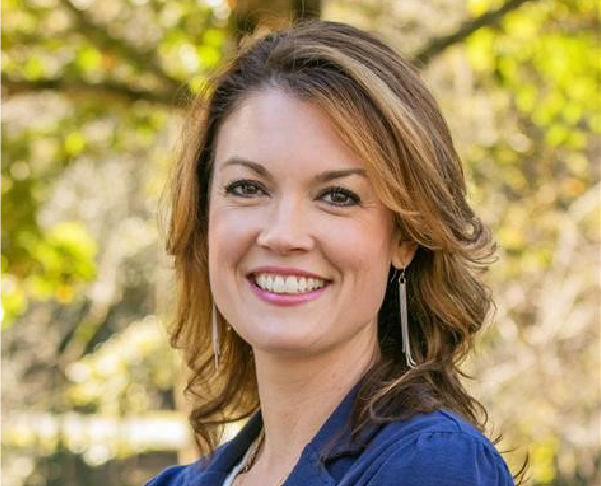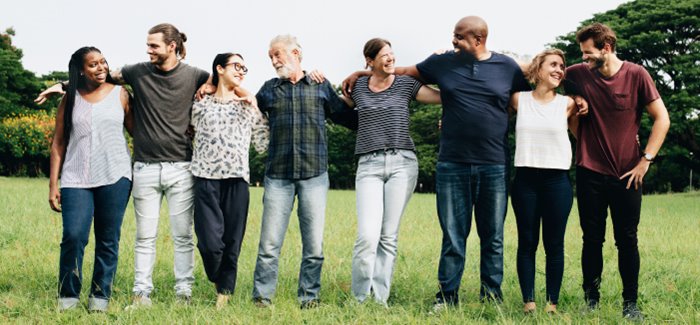A “Gift” of Feeling Well
After living with pain and desperation, Stacy Courtnay embraces gratitude.
 Updated Sept. 16, 2024
Updated Sept. 16, 2024
Stacy Courtnay jokes that stress from getting married is what triggered her rheumatoid arthritis (RA). Her pain started shortly after her wedding 21 years ago to her husband, Taylor, when she was 24.
But it wasn’t a joking matter. Her feet felt like they’d been pounded with a hammer. Then pain shot into her shoulders so she couldn’t lift her arms, and it spread to her wrists, which swelled up. She was finally diagnosed at age 25 and started taking prednisone, which helped her symptoms. Her doctor wanted to start her on a biologic as well, but she was fearful it might interfere with her plans to have children. Within a couple of years, she was pregnant.
A Point of Desperation
Pregnancy brings relief from RA symptoms for some people — but not for Stacy. She had stopped the prednisone due to her pregnancy. But without it she couldn’t even walk, so she had to resume the medication. (Despite the risk and her worries, she and her baby were not affected by it.)
After her son, John, was born, her RA only got worse. Stacy could barely move. Her husband had to carry her to the bathroom, and she could barely pick up a cup, much less her new baby.
“[Taylor] was the one who was taking care of me. Then when we had John, my parents, who lived about an hour away, moved in with us,” says Stacy, now 46. Taylor and her parents were all working, “but they all tag-teamed because I couldn’t physically hold John or feed him, and I would just lie in bed and cry. I had really bad postpartum depression because I couldn’t take care of John, and I was in pain.”
Her rheumatologist started her on a biologic medication, which didn’t work for her. Neither did a second. Or a third.
Frustrated with the medications and desperate for pain relief, she turned to what she now calls “witch potions.” She tried all sorts of diets — no-sugar diet, a raw diet, an “eating for your blood type” diet, a gluten-free diet. She went to a clinic to receive mineral infusions, and she tried chelation therapy, which promises to remove heavy metals from the bloodstream. She even tried drinking food-grade peroxide for a “peroxide cure,” and “oil pulling,” which is supposed to cure by pulling toxins from the body. Meanwhile, she was lying to her doctor and avoiding her biologic injections.
Finding Her “Miracle Drug”
Finally, on a Saturday in 2011, she called her rheumatologist in tears and confessed what she had been doing. Her doctor put her back on prednisone, then added a different biologic — her “miracle drug,” which has successfully controlled her RA symptoms without side effects since 2012.
Stacy’s RA was active for four or five years before she tried any disease-modifying drugs, yet the only physical signs of her RA are slight damage in her hands, surgery on one wrist and large nodules on her elbows that, as her son pointed out, make her look like she has four elbows — a name she now uses for her fundraising team for Walk To Cure Arthritis, "Team Four Elbows."
Stacy is a valued volunteer for the Arthritis Foundation. She is on the Patient Perspective Panels (PPP) and has served as a patient representative for several national projects within the Foundation. She has served as the Georgia Leadership Board Chair since 2022, and chaired the Crystal Ball in 2022 and 2023, one of the Foundation’s marquee fundraising events. She also received the Champion Award in 2022, an award given to outstanding volunteers nationwide.
When she wonders aloud about taking a drug holiday, her husband and family shut that idea down immediately, Stacy says with a laugh. The elbow nodules and the fatigue she still battles constantly — with a daily nap — signal that her RA is still active, her doctor reminds her. “‘You were so bad for so long; you don’t have any side effects from [the medication]. Why would you do it?’” he points out. “So, for the sake of my family — they gave up so much to take care of me — I’m not going to try a drug holiday,” Stacy says. “Maybe eventually, but right now, it’s not worth it. My quality of life is so great.”
In addition to taking her meds to manage her RA, she sees a therapist to help with the anxiety of having the disease, and she still uses a lot of complementary therapies, including turmeric, collagen and probiotics supplements, eating organic foods and reducing gluten. “I don’t know if they work or not, but in my mind, they help,” she says. “It’s not like I’m hardcore about any of those things. I don’t really think any one thing is going to cure me, but maybe all together it’s just helpful.”
She also exercises a lot — high-intensity interval workouts, light weights, boot camp-type workouts. The exercise helps her arthritis, she says, but that’s not the main reason she loves it. “It’s a gift that I’m feeling so good. I try to do six days a week just because I can. There were so many years that I couldn’t do anything, so I feel like I have to seize the opportunity to exercise.”
See Stacy Courtnay in action in the Your Exercise Solution (YES) fitness videos and hear her on the Live Yes! With Arthritis podcast.
Story of Yes
Say Yes! Share Your Story
One of the most powerful things you can do to help others living with arthritis is share your story. If you have arthritis, care for someone who does or are making an impact in the arthritis community, your experiences can help someone who may feel alone. Whether you're a patient, caregiver, donor, volunteer or researcher — you can be an inspiration by sharing your Story of Yes.
Share Your Story
Carlos Câmara: Cycling to Fight Arthritis
Jessica Thomas: Surviving Covid 19 With axSpA & RA
Stay in the Know. Live in the Yes.
Get involved with the arthritis community. Tell us a little about yourself and, based on your interests, you’ll receive emails packed with the latest information and resources to live your best life and connect with others.
